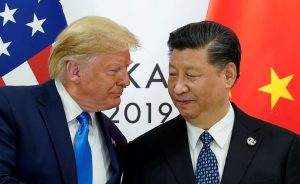 Errors have been made. And inconsistencies have occurred. But the current Trump policy toward China and its apparent encouragement of a renewal of ‘the Cold War’ – in this instance with China – is simply stupefying. And very likely dangerous. As the Editorial Board of the Washington Post (WP) put it on August 6th:
Errors have been made. And inconsistencies have occurred. But the current Trump policy toward China and its apparent encouragement of a renewal of ‘the Cold War’ – in this instance with China – is simply stupefying. And very likely dangerous. As the Editorial Board of the Washington Post (WP) put it on August 6th:
Still, the risks are real, and Mr. Trump’s approach inspires no confidence that he has some strategic objective in mind, as opposed to the continuation of conflict with China for its own sake. We don’t expect the president to announce his negotiating goals in advance. He should, however, base policy on objective economics, not a general anti-China animus.
A low-level policy debate has been encouraged in the WP pages and more broadly in the academic and policy publications. Hopefully, the politicians – especially all those folk running for the Democratic nomination for President – have, or will pay attention to these debates and will respond in a thinking way to the destructive Trump policy. There are a variety of views expressed in the WP – all worth considering.
The spark to this debate began with an open letter that was published in the WP Opinion section. The ‘Scholars’ Statement ‘was published on July 3rd: “China is not the enemy” M. Taylor Fravel, J. Stapleton Roy, Michael D. Swaine , Susan A. Thornton and Ezra Vogel were the five principals that organized this statement on U.S.-China relations. All the principals are well known China hands, either academics or policy folk. After completing the Statement the principals then opened the opinion piece for signature and scholars and policy folk signed on. There were many signatories including an historian from Georgetown, James Millward . I mention him specifically because he critiqued the Statement. And In his critique he identified a response to the Statement published on July 18th in The Journal Political Risk, titled “Stay the Course on China: An Open Letter to President Trump”. This Letter was penned by James Fanell, Captain USN (Retired), and former director of Intelligence & Information Operations U.S. Pacific Fleet. This Letter too was opened to signature. As the title implied the Letter supported President Trump and the China actions his Administration has implemented:
We the undersigned, are encouraged by the broad and coherent strategy of robust, alternative policies you have adopted to confront the PRC’s campaign to undermine the national interests of the United States an its allies. We encourage you to stay the course on your path of countering Communist China.
The “Stay the Course” Letter is in marked contrast to the Statement. This Statement consisting of 7 Propositions contains this core view from Proposition 2:
2. We do not believe Beijing is an economic enemy or an existential national security threat that must be confronted in every sphere; nor is China a monolith, or the views of its leaders set in stone. Although its rapid economic and military growth has led Beijing toward a more assertive international role, many Chinese officials and other elites know that a moderate, pragmatic and genuinely cooperative approach with the West serves China’s interests. Washington’s adversarial stance toward Beijing weakens the influence of those voices in favor of assertive nationalists. With the right balance of competition and cooperation, U.S. actions can strengthen those Chinese leaders who want China to play a constructive role in world affairs.
There is then great contrast in the proposed courses of action urged by each. And there is much to be gained from the additional views arising from the WP Statement. Further assessment here is called for. But this post was prepared to alert readers that we were fortunate enough to join Susan Thornton, one of the principals, of the Letter in an upcoming Global Summitry podcast. Susan is currently a Visiting Lecturer at Yale Law School and Senior Fellow at the Paul Tsai China Center. She worked several decades in the U.S. government concluding as the Assistant Secretary of State for East Asia and Pacific Affairs.
We are hoping to have the podcast up at our Oxford Global Summitry streaming site and for also available for download at iTunes and SoundCloud by – we are hoping – by Thursday August 22. Don’t miss Susan’s podcast.
Image Credit: Kevin Lamarque/Reuters

